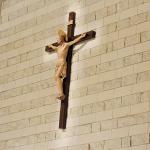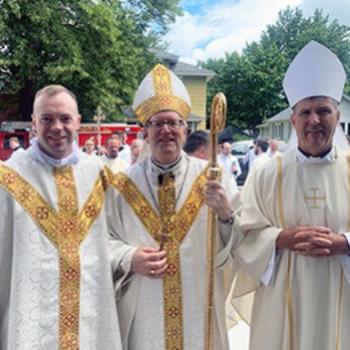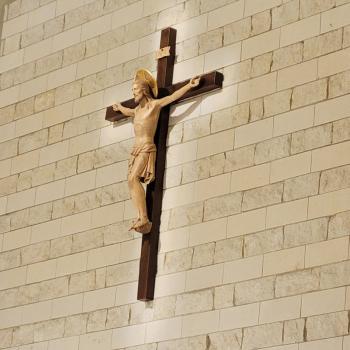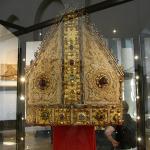Recently, Catholic apologist Jimmy Akin and former Catholic (now Protestant) apologist Frank Turek discussed Catholic misconceptions on Turek’s YouTube channel. During the exchange, Turek made the following claim:
Now, I as you know, as I said, I was brought up Catholic. I went to Catholic High School, and this is just anecdotal…I never heard the word grace from a homily. I never, in hundreds of sermons, ever heard Jesus died for your sins and by trusting in Him you’re justified.
As a Catholic convert, the above statement puzzles and frustrates me. Why? Glad you asked… You see, anyone who pays attention during Mass hears about grace, and more importantly, the Gospel, at every single Mass—every single one!
For this article, I provide proof that Catholics get presented with not only grace, but the Gospel during every Mass they attend. Can I guarantee they will hear it? No. As with the parable of the seed and the soil, whether the message takes root depends on those receiving it.
A Word on Catholic Homilies
For those unfamiliar with homilies in the Catholic Church (they equate to sermons in Protestantism), the priest usually spends fifteen to twenty minutes teaching on the assigned readings. These reading come from Old Testament, New Testament (usually letters of St. Paul), and Gospels. The Gospel reading, as coming from Jesus, represent the focus of the homily. If these readings mention grace, the priest or deacon will mention it. For example, the Fourth Sunday of Lent Year B reading from March 13th, of 2021. In these readings, we see St. Paul’s words in Eph 2:4-10:
Brothers and sisters: God, who is rich in mercy, because of the great love he had for us, even when we were dead in our transgressions, brought us to life with Christ — by grace you have been saved —, raised us up with him, and seated us with him in the heavens in Christ Jesus, that in the ages to come He might show the immeasurable riches of his grace in his kindness to us in Christ Jesus. For by grace, you have been saved through faith, and this is not from you; it is the gift of God; it is not from works, so no one may boast. For we are his handiwork, created in Christ Jesus for the good works that God has prepared in advance, that we should live in them.
Moreover, a good example is this homily. Clocking in at seven minutes and seventeen seconds, the good priest relates the truth of God’s word and our need for Christ, especially in the graces of the sacraments.
The Eucharist as a Presentation of the Gospel
One of the most beautiful presentations of the Gospel comes in form of the Eucharist and the prayers offered by the people of God during the Sacrifice of the Mass. For all who misinterpret what this sacrifice represents, a “re-sacrifice” of Christ it is NOT. Christ died once and for all. He dies no longer. Eucharist means Thanksgiving. Therefore, we offer our gifts in thanks to God, the source of all good gifts. As the Catechism states:
1356 If from the beginning Christians have celebrated the Eucharist and in a form whose substance has not changed despite the great diversity of times and liturgies, it is because we know ourselves to be bound by the command the Lord gave on the eve of his Passion: “Do this in remembrance of me.”
1357 We carry out this command of the Lord by celebrating the memorial of his sacrifice. In so doing, we offer to the Father what he has himself given us: the gifts of his creation, bread and wine which, by the power of the Holy Spirit and by the words of Christ, have become the body and blood of Christ. Christ is thus really and mysteriously made present.
1358 We must therefore consider the Eucharist as:
– thanksgiving and praise to the Father;
– the sacrificial memorial of Christ and his Body;
– the presence of Christ by the power of his word and of his Spirit.
In the Eucharist, the drama of the Gospel is re-presented to all in attendance. As shown in the next section, in the prayers of the Eucharist, the faithful proclaim and participate in the life, death, and resurrection of Jesus Christ (the Gospel).
The Gospel as Prayer
Furthermore, when one reads (or listens) to the Eucharistic prayers during the Mass, a clear message of God’s grace and salvation achieves preeminence. For example, in the hymn sung after the Penitential Act, the faithful proclaim:
Lord God, heavenly King, O God, almighty Father. Lord Jesus Christ, Only Begotten Son, Lord God, Lamb of God, Son of the Father, you take away the sins of the world, have mercy on us; you take away the sins of the world, receive our prayer;
And
It is truly right and just, our duty and our salvation, always and everywhere to give you thanks, Father most holy, through your beloved Son, Jesus Christ, your Word through whom you made all things, whom you sent as our Savior and Redeemer, incarnate by the Holy Spirit and born of the Virgin. Fulfilling your will and gaining for you a holy people, He stretched out his hands as he endured his Passion, so as to break the bonds of death and manifest the resurrection. And so, with the Angels and all the Saints we declare your glory, as with one voice we acclaim: Holy, Holy, Holy Lord God of hosts. Heaven and earth are full of your glory. Hosanna in the highest.
And again:
We proclaim your Death, O Lord, and profess your Resurrection until you come again.
Moreover, before the faithful receive the Eucharist, the priest says:
Behold the Lamb of God, behold Him who takes away the sins of the world. Blessed are those called to the supper of the Lamb.
Then, he and the people proclaim:
Lord, I am not worthy that you should enter under my roof, but only say the word and my soul shall be healed.
Finally, the faithful then go up and receive the body and blood of Jesus presented to them in the bread and wine with a “Amen.”
Whoever Has Ears, Let Them Hear
Clearly, anyone who listens and engages in the Mass hears the Gospel. Likewise, anyone who hears the Gospel presented in the Mass understands the working of God’s grace in the divine mystery before them. Those who truly hear and receive say, “Amen,” which means I believe. Anyone coming away from such an experience without hearing the Gospel and God’s grace says more about them than it does about what happens at the Mass.
Final Thoughts…
To conclude, I see no reason to believe Mr. Turek’s testimony that he “never heard Jesus died for your sins…” Was he listening? Every Sunday, and every day if he so wished to attend daily Mass, Mr. Turek said the above words or heard them said by the priest. Did he also not confess the Athanasian Creed? Particularly regarding Christ:
For us men and for our salvation he came down from heaven, and became man, and by the Holy Spirit was incarnate of the Virgin Mary, and became man. For our sake he was crucified under Pontius Pilate, he suffered death and was buried, and rose again on the third day in accordance with the Scriptures. He ascended into heaven and is seated at the right hand of the Father.
Below, I address Frank Turek personally.
Unfortunately, you did not listen, Frank. This is the plain and simple truth of the matter. Had you listened, you would have heard what all listening Catholics hear—the Gospel and the grace of God. I invite you to come back and take another listen. Fortunately for you, the doors are always open. Come home.
Thank you!
Read The Latin Right’s other writing here.
Please visit my Facebook page and IM your questions (and follow my page) or topics for articles you would like covered.
Also, please subscribe my YouTube page for updates on upcoming articles.

















